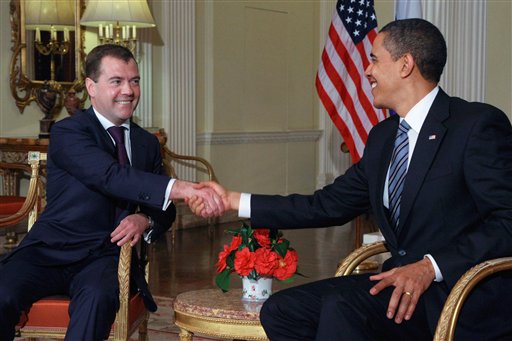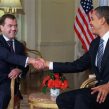
Moscow Shows no Interest in Pushing a “Reset Button” in Relations With NATO
Publication: Eurasia Daily Monitor Volume: 6 Issue: 67
By:

Anti-Americanism has noticeably mellowed in the Russian mainstream media since the London summit between presidents Barack Obama and Dmitri Medvedev. Some commentators emphasize that strategic arms control is the easiest problem to tackle, but the new positive tone in the dialogue makes the habitual U.S.-bashing politically incorrect (Rossiiskaya Gazeta, April 7). There is, however, hardly any change of attitude towards NATO, so the jubilee 60th anniversary summit in Strasbourg/Kehl was portrayed as high on pomp and low on content with the prime focus on the violent demonstrations (Vremya Novostei, Kommersant, April 6). The Alliance’s intention to prioritize its relations with Russia did not impress Moscow, and Dmitri Rogozin, the Russian permanent representative at NATO, promised that discussions at the forthcoming meeting of the NATO-Russia Council would be dry and tough (www.newsru.com, April 6).
It is certainly not lost on Moscow that the European allies showed scant enthusiasm about Obama’s appeal to redouble collective efforts in confronting the mounting instability in Afghanistan (Nezavisimaya Gazeta, April 6). Bitter experience informs the dominant opinion within Russia that the international military operation in Afghanistan is a hopeless enterprise, but there are few doubts inside the Russian leadership that a victory of the irrepressible Taliban would be detrimental to stability in Central Asia. Expecting NATO to continue carrying this heavy burden indefinitely, Moscow demonstrates readiness to assist in the transit of non-military supplies to Afghanistan. What makes this bargaining particularly rewarding is the closure of the U.S. airbase Manas in Kyrgyzstan that was finalized by President Kurmanbek Bakiyev exactly on the day of NATO jubilee after strong urging from Russia, reinforced by credit amounting to $2 billion (www.rbc.ru, April 2; RIA-Novosti, March 6). The final touch in this case was made by the documentary “The Base” shown on the Rossiya TV channel on April 5 that depicted Manas as a center of U.S. espionage, much to the chagrin of the Pentagon (www.lenta.ru, April 6).
Afghanistan is a painful problem for NATO that Moscow plans to squeeze to its advantage, but Georgia remains the main trouble-spot in its relations with the Alliance, about which Medvedev and Obama were able only to “agree to disagree.” Even putting Georgia’s plea for accession on hold, NATO is under a strong moral obligation to help it in dire straits, but the appeal to Russia “to reverse its recognition” of Abkhazia and South Ossetia at best would be simply shrugged off in Moscow. Every symbolic gesture of Atlantic solidarity is interpreted by the Russian leadership as an unwarranted interference in the evolving conflict where small incidents, like the interdiction of a Russian merchant ship for crossing Georgian territorial waters, are set to generate high tensions (www.newsru.com, April 7). Georgia’s rearmament is certain to remain a major source of controversy, and while its right to rebuild the armed forces is undeniable, Moscow will protest furiously against every military aid program launched by NATO.
The declaration adopted at the NATO summit lists the usual avenues for cooperation with Russia but on closer examination most of them have reached solid dead-ends. Conventional arms control has been effectively derailed by Russia’s withdrawal from the CFE Treaty, and the deployment of Russian troops in Abkhazia and South Ossetia guarantees that this breakdown is irreversible. Nuclear non-proliferation might appear a more promising area, but Moscow’s refusal to condemn North Korea for its long-range ballistic missile test left the UN Security Council unable to adopt any meaningful resolution on that matter. This indicates that any scope for practical cooperation is in fact limited (RIA-Novosti, April 7). Even on counter-terrorism, the level of mutual understanding is far shallower than presumed, since Moscow is confident that its own “war on terror” in Chechnya has been successfully concluded; and now the problem is only how to keep Ramzan Kadyrov -the key part of the solution- from murdering his opponents in every possible location from Moscow to Dubai (Ezhednevny Zhurnal, April 6).
Energy security, in which NATO expresses growing interest, is certainly not a topic which Russia wants to discuss with the Alliance; even the EU has aroused Moscow’s wrath by declaring the intent to modernize Ukraine’s gas infrastructure. Prime Minister Vladimir Putin in his report to the State Duma issued a warning that attempts to exclude Russia from decision-making on energy matters would be “counter-productive” and now steers Gazprom to strike back together with its key allies such as the German E.ON and Italian ENI (Kommersant, April 6).
Moscow suspects that for NATO the course to expanding its dialogue with Russia is simply a means to justify its own relevance -and so it limits this dialogue to matters where it can exploit internal disagreements within the Alliance. Medvedev follows the well-established pattern of denial of NATO’s central role as a security provider for the majority of European states. However, his own proposals about a new European security “architecture” remain so vague that no meaningful discussion appears possible, despite the numerous positive signals from the West. Fedor Lukyanov, one of the few independent analysts in Moscow, suggests that instead of aiming at weakening NATO, Russia should try to develop a wider design for Eurasian security architecture (www.globalaffairs.ru, April 6). This idea might help to reduce the mostly imaginary geopolitical competition in Central Asia, but it does not address conflicts of interest in many European trouble spots, for instance, the riots in Moldova (www.gazeta.ru, April 8).
Russia’s negative attitude to NATO is neither a leftover from Cold War dogmas nor a consequence of the acute “Kosovo syndrome” caused by the bombing of Yugoslavia ten years ago. It is driven by the understanding that the Alliance is based on more than just a shifting balance of geopolitical interests, that the member-states share the readiness to stand together and defend fundamental values that are not a subject for debate. These values remain alien to the corrupt, bureaucratic regime built by Putin -but they are not foreign to Russia; the regime’s survival, therefore, requires that NATO is seen as an enemy.




